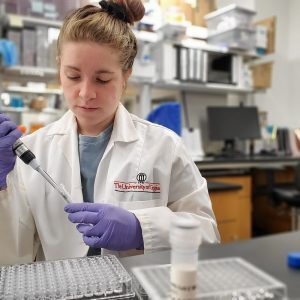News
Presbyterian College Graduate Studying the Novel Coronavirus
Press Release
 Presbyterian College graduate Sydney Ronzulli (right) has been working on experiments with the novel coronavirus that could serve as evidence for opening businesses and states.
Presbyterian College graduate Sydney Ronzulli (right) has been working on experiments with the novel coronavirus that could serve as evidence for opening businesses and states.
“I am specifically focusing on developing experiments to detect human antibodies toward the novel SARS-CoV-2,” she said.
According to Ronzulli, several methods for detecting the novel coronavirus have already been established and used in a clinical setting. However, they allow detection for only a short period of time.
“Serological experiments (experiments using serum) allow a person to understand the antibody response that is mounted in response to the virus, determine the real infection and infection fatality rates, and can identify individuals who are potentially immune after reinfection,” she said.
Learning about the Coronavirus
Since COVID-19 emerged so fast, there haven’t been enough substances that can be used in experiments that can bind to the coronavirus to know if the virus is actually there.
“It could be, but if our substance is not correct, we could never truly know,” Ronzulli said.
That’s where Ronzulli and fellow researchers at the University of Georgia College of Veterinary Medicine come in. They’ve been collaborating with Dr. Florian Krammer, a renowned virologist at the Icahn School of Medicine at Mt. Sinai. Krammer developed the experiments and substances to bind to the coronavirus.
“Dr. Krammer sent us reagants (the substances that bind to the coronavirus) that went through multiple rounds of testing with SARS-CoV-2 to prove they are reliable for binding and detecting the virus as well,” Ronzulli said.
Can someone get the coronavirus more than once?
Ronzulli is helping to troubleshoot and optimize the experiments to make sure the results can be reproduced and are consistent. Once they are, they can be used in research studies and for testing in clinical laboratories.
“These studies are very important because several researchers have shown that reinfection does not occur once antibody responses have been mounted,” Ronzulli said.
“What this means for us is that individuals who have mounted an immune response to SARS-CoV-2 are likely now immune and are unlikely to transmit the virus to others.
“That would mean healthcare workers who are immune can take care of COVID-19 patients with minimal risk to themselves, their coworkers or other patients.”
A Passion for Research
Ronzulli originally decided to pursue a doctor of veterinary medicine after earning her biology degree from PC in 2017. She says her professors at PC served as inspiration for her to pursue more research-based work.
“Their aid and enthusiasm helped me harbor the love and passion I had for research,” Ronzulli said.
Now, she is pursuing a PhD in Comparative Biomedical Sciences with an emphasis in Infectious Diseases.
“I chose infectious disease because I really like how involved you can be in the research and how much of an impact you can make,” Ronzulli said. “There are so many gray areas within infectious disease which allows you to become a well-encompassed scientist instead of only focusing in one area or one disease.”
























